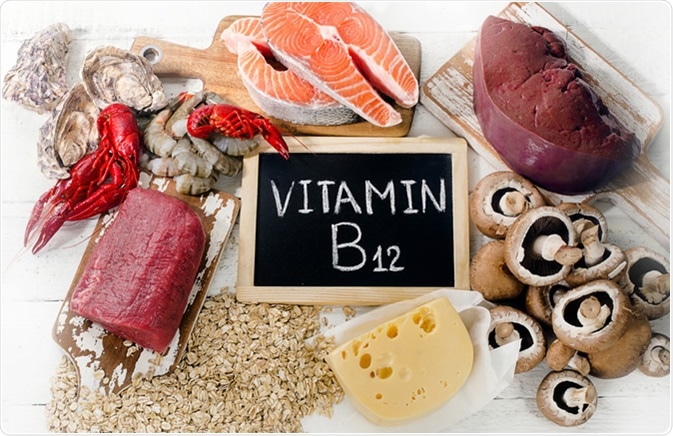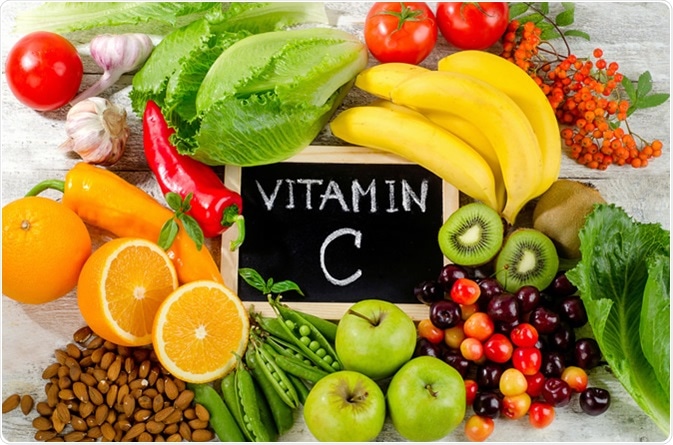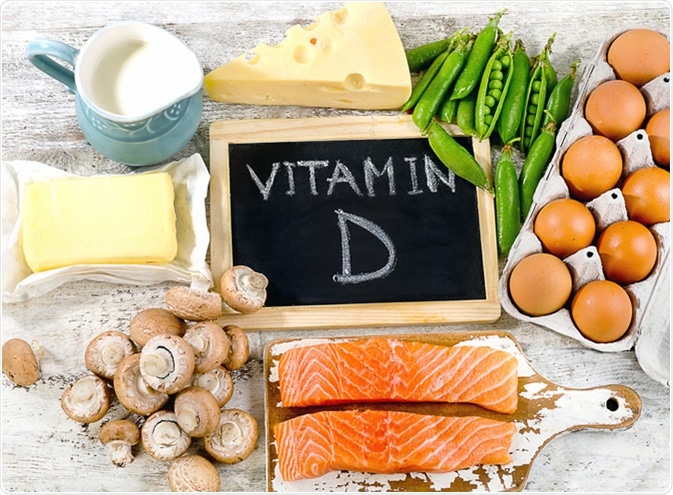Skip to:
During pregnancy, the body prepares for the fetus’ development and the breastfeeding process. The body goes through many physical and hormonal changes. The mother needs to consume more foods rich in vitamins and nutrients to support the baby.
Proper weight gain and eating healthily reduces the risk of complications. Subsequently, the woman’s nutritional condition affects the infant later in life, particularly in his cognitive development, heart health, and the tendency to become overweight or obese.
The food pregnant mothers eat is the major source of nourishment of the body, so it’s vital to consume foods that are rich in vitamins and nutrients.
What vitamins and nutrients are essential during pregnancy?
Vitamin B12
Vitamin B12 or Cobalamin is an essential vitamin that plays a pivotal role in the production of red blood cells. It’s also important for neurological function and DNA synthesis. Vitamin B12, which is bound to protein in food, is released by the activity of gastric protease and hydrochloric acid in the stomach.
When combined with folic acid during pregnancy, vitamin B12 can help prevent spina bifida and other spinal or central nervous system birth defects. Mothers deficient in B12 are more likely to give birth to infants affected by spina bifida.
The major sources of vitamin B12 are beef, ham, pork, fish, dairy products, eggs, chicken, nutritional yeast products, and lamb.

Sources of Vitamin B12 (Cobalamin). Image Credit: Bitt24 / Shutterstock
Vitamin C
Vitamin C, also known as ascorbic acid, is a vitamin that occurs naturally in some foods. It can also be available as a dietary supplement. Vitamin C is an antioxidant that’s important for the skin, bones, and connective tissues. Aside from this, it helps the body absorb iron and boost the immune system.
Vitamin C during pregnancy may help reduce complications such as maternal anemia, intrauterine growth restriction, and pre-eclampsia. The most common sources of vitamin C include broccoli, greens, tomatoes, citrus fruits, and red or green peppers.

Foods High in vitamin C. Image Credit: bitt24 / Shutterstock
Vitamin D
Vitamin D helps the body absorb calcium, which is needed for strong bones. People can get vitamin D by exposing bare skin to sunlight. You can also get vitamin D through supplements and diet.
Vitamin D is very important for mothers and their developing babies. It plays an important role in bone metabolism by regulating the calcium and phosphate balance. It also helps reduce the risk of low birth weight, pre-eclampsia, and preterm birth.
Foods rich in vitamin D include fatty fish such as salmon, mackerel, and tuna, beef liver, egg yolks, and cheese.

Foods rich in vitamin D. Image Credit: bitt24 / Shutterstock
Folate
Folate is a B-vitamin that helps produce DNA and other genetic materials. Folate is important in red blood cell production and to reduce the risk of neural tube defects, such as spina bifida.
Foods rich in folate include legumes, asparagus, leafy green vegetables, beets, eggs, citrus fruits, broccoli, and brussels sprouts. Both dietary consumption and supplementation are recommended. To be effective in preventing neural tube defects during development, women wishing to become pregnant should initiate folate supplementation prior to conception.
Iron
Iron is an important mineral needed by the body for various functions. For instance, iron is a part of hemoglobin, a protein that carries oxygen from the lungs to the different cells of the body. Plus, it aids in the storage and use of oxygen in the muscles.
During pregnancy, the body’s blood volume rises to compensate for the increased demand for nutrients and oxygen. The demand for iron goes up to cope with the increased blood supply. The needed amount of iron should be doubled to about 27 mg per day. The most common sources of iron include green leafy vegetables, beans and lentils, tofu, cashews, fortified breakfast cereals, baked potatoes, and whole grains, to name a few.
Calcium
Calcium, a mineral important for life, helps build bones. It also enables the blood to clot, aids in muscle contraction, and helps the heart to beat. But, about 99 percent of all calcium stores in the body is in the bones and teeth.
During pregnancy, the body needs calcium from food or supplements. The recommended dosage is about 1,000 mg of calcium each day. Foods rich in calcium include cheese, milk, and yogurt.
What are the dangers of vitamin deficiency during pregnancy?
Vitamin deficiency during pregnancy may cause a wide array of maternal and fetal complications.
Vitamin B12 deficiency
Low levels of vitamin B12 during pregnancy may increase the likelihood of neural tube defects. In a study, the researchers found that mothers of children affected by neural tube defects had significantly lower vitamin B12 status.
Vitamin D deficiency
Vitamin D deficiency has been associated with an increased prevalence of pre-eclampsia, which is a common cause of mortality among pregnant women and their infants. According to a study, adverse health outcomes such as low birth weight, pre-eclampsia, neonatal hypocalcemia, bone fragility, heightened risk of developing of autoimmune diseases, and poor postnatal growth have been linked to low vitamin D levels during pregnancy.
Vitamin C deficiency
Vitamin C deficiency among pregnant women may lead to serious health effects on the fetus’ brain. In a study, the researchers said that even marginal vitamin C deficiency in the mother prevents the baby’s hippocampus, an important part of the brain responsible for memory, from developing by about 10 to 15 percent.
The best way to ensure that a woman’s body has appropriate vitamin levels to support a healthy pregnancy is to establish healthful eating habits prior to becoming pregnant. A prenatal care visit is highly recommended to address any potential nutritional deficits that should be addressed prior to trying to conceive. Folate supplementation is also recommended pre-conception and during pregnancy to prevent neural tube defects. The usefulness of vitamin supplements during pregnancy for vitamin B12 and vitamin C is less clear and is currently under study. Healthcare providers may recommend that pregnant women take calcium and iron supplements during pregnancy to ensure that the mother has appropriate levels to maintain her own bone and blood health.
Sources
- American Pregnancy Association. (2019). https://americanpregnancy.org/pregnancy-health/vitamin-b-pregnancy/
- National Institute of Child Health and Human Development. (2017). www.nichd.nih.gov/health/topics/pregnancy/conditioninfo/prenatal-care
- Pannia, E., Cho, C.E., Kubant, R., Sanchez-Hernandez, D., Huot, P.S., Anderson, H. (2016). Role of maternal vitamins in programming health and chronic disease. Nutrition Reviews. https://www.ncbi.nlm.nih.gov/pmc/articles/PMC4892288/
- Rumbold, A, Nagata, O., Shahrook, S., and Crowther, C.A. (2015). Vitamin C supplementation in pregnancy. Cochrane Database of Systematic Reviews. https://www.ncbi.nlm.nih.gov/pubmed/26415762
- Chidambaram, Balasubramaniam. (2012). Folate in pregnancy. Journal of Pediatric Neurosciences. https://www.ncbi.nlm.nih.gov/pmc/articles/PMC3519088/
- Molloy, A., Kirke, P.,Troendle, J., Burke, H., Sutton, M., Brody, L., Scott, J., and Mills, J. (2009). Maternal Vitamin B12 Status and Risk of Neural Tube Defects in a Population With High Neural Tube Defect Prevalence and No Folic Acid Fortification. Pediatrics. https://www.ncbi.nlm.nih.gov/pmc/articles/PMC4161975/
- Finkelstein, J., Layden, A., Stover, P. (2015). Vitamin B-12 and Perinatal Health. Advances in Nutrition. https://www.ncbi.nlm.nih.gov/pmc/articles/PMC4561829/
- McCullough, M. (2007). Vitamin D Deficiency in Pregnancy: Bringing the Issues to Light. The Journal of Nutrition. https://academic.oup.com/jn/article/137/2/305/4664522
- Mulligan, M., Felton, S., Riek, A., and Bernal-Mizrachi, C. (2009). Implications of vitamin D deficiency in pregnancy and lactation. American Journal of Obstetrics and Gynecology. https://www.ncbi.nlm.nih.gov/pmc/articles/PMC3540805/
- Nyborg, P., Vogt, L., Schjoldager, J., Jeannet, N., Hasselholt, S., Paidi, M., Christen, S., and Lykkesfeldt, J. (2012). Maternal Vitamin C Deficiency during Pregnancy Persistently Impairs Hippocampal Neurogenesis in Offspring of Guinea Pigs. Plos One. journals.plos.org/plosone/article?id=10.1371/journal.pone.0048488
Further Reading
Last Updated: Aug 13, 2019